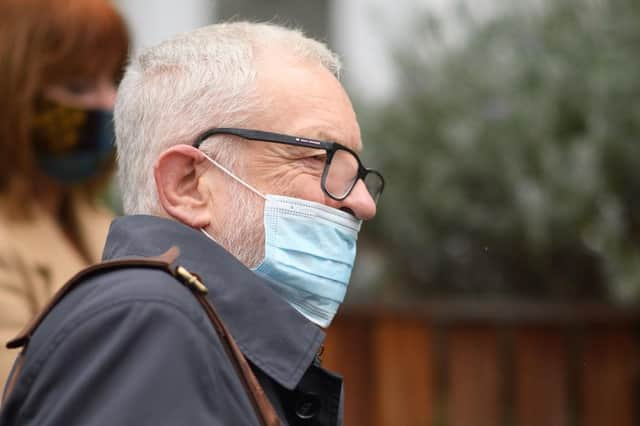Labour Party: history of antisemitism explained after damning EHRC report - and who was the leader before Jeremy Corbyn?


On October 29 a report accused the Labour party of “serious failings in the... party leadership in addressing antisemitism and an inadequate process for handling antisemitism complaints”.
The investigation by the Equality and Human Rights Commission (EHRC) found that the party under the leadership of Jeremy Corbyn had been guilty of three breaches of the equalities act including harassment and political interference.
Advertisement
Hide AdAdvertisement
Hide AdFollowing the release of the report, Corbyn had the party whip removed after he claimed that the extent of antisemitism in the party had been "dramatically overstated" by political opponents.
Though Labour’s relationship with antisemitism has come under intense scrutiny during and after Jeremy Corbyn’s reign as leader, examples of anti-Jewish rhetoric can be traced to the party’s founding.
Examples of antisemitism in Labour’s history
Examples of antisemitism in the Labour movement can be traced to the 19th century, with some followers subscribing to antisemitic tropes about followers of Judaism holding disproportionate amounts of power.
For example in 1891 in the Labour Leader, the independent newspaper of the Labour movement, the following deeply antisemitic passage could be found:
“Wherever there is trouble in Europe, wherever rumours of war circulate and men’s minds are distraught with fear of change and calamity, you may be sure that a hooked-nosed Rothschild is at his games somewhere near the region of the disturbances.”
Nine years later the Trade Unions Congress argued that the Second Boer War was being fought “to secure the gold fields of South Africa for cosmopolitan Jews, most of whom had no patriotism and no country.”
Founder of the Labour Party Keir Hardie also subscribed to these unsavoury beliefs, once claiming “modern imperialism is really run by half a dozen financial houses, many of them Jews, to whom politics is a counter in the game of buying and selling securities.”
In the late 20th century there were more prominent examples of antisemitism in the party. As editor of the Labour Herald Ken Livingstone published an article alleging that Zionists prevented the rescue of European Jewry from the Holocaust.
Advertisement
Hide AdAdvertisement
Hide AdThe article featured the Israeli Prime Minister wearing a Nazi uniform, giving a Nazi salute below the heading “The Final Solution”.
Antisemitism under Corbyn
Livingstone would later cause controversy when in 2016 he said: "When Hitler won his election in 1932 his policy then was that Jews should be moved to Israel. He was supporting Zionism before he went mad and ended up killing six million Jews."
His comments were in reaction to the sacking of MP Naz Shah after she made several disparaging comments about the state of Israel, drawing comparisons between the Israeli leadership and Nazis.
The comments were deemed by Jeremy Corbyn as “offensive and unacceptable”.
In 2019 it emerged that hundreds of complaints over antisemitic comments by Labour members had been made to the central party over the previous years.
Many complaints related to the sharing of social media posts containing antisemitic tropes suggesting that Jews were wealthy or controlled the media and government.
Labour were accused of not being strong enough in dealing with antisemitism in the party.
Has Corbyn been accused of antisemitism?
Corbyn himself has been accused of harbouring antisemitic views, accusations which he has vehemently denied.
Advertisement
Hide AdAdvertisement
Hide AdIn 2018 he apologised for supporting a graffiti artist whose works contained several antisemitic tropes. He has also apologised for referring to Hamas and Hezbollah as “friends”.
In 2018 a joint editorial by the UK’s three most prominent Jewish newspapers said a government led by Corbyn would pose an existential threat to Jews in the UK.
Who was Labour leader before Jeremy Corbyn?
Complaints of antisemitism predate Corbyn’s leadership with Ed Miliband, the first Jewish leader of the Labour party.
During his tenure he was criticised by the Jewish community for his calls to recognise Palestine as a separate state.
During his reign he said Labour would take a “zero-tolerance approach” to antisemitism.
He said: “The recent spate of incidents should serve as a wake-up call for anyone who thought the scourge of anti-Semitism had been defeated and that the idea of Jewish families fearful of living here in Britain was unthinkable.
“Some have told me how, for the first time in their lifetime, they are scared for their children’s future in our country. Others have expressed a general unease that this rise in antisemitism could signal that something has changed – or is changing – in Britain.”
What did the EHRC report allege?
The EHRC identified serious failings in the Labour Party leadership in addressing anti-Semitism and an inadequate process for handling antisemitism complaints.
Advertisement
Hide AdAdvertisement
Hide AdThe party is responsible for three breaches of the Equality Act (2010) relating to: political interference in complaints, failure to provide adequate training to those handling antisemitism cases and harassment.
The EHRC found evidence of political interference in the complaints process, with 23 instances of inappropriate involvement by the Leader of the Opposition’s Office (LOTO) and others in the 70 files the watchdog looked at.
They included LOTO staff influencing decisions, including on suspensions or whether to investigate claims.
The EHRC found the situation to be indirectly discriminatory and unlawful as it put the person making the complaint at a disadvantage.
The watchdog found that the lack of training for people handling antisemitism complaints indirectly discriminated against Jewish members until August 2020, by which time Sir Keir Starmer was leader of the party.
The party has been served with an unlawful act notice and has been given until December 10 to draft an action plan to implement the report’s recommendations, which is legally enforceable by the courts if not fulfilled.